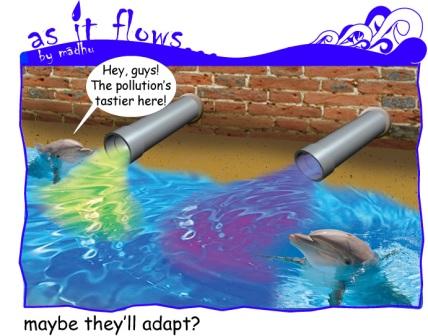Sustainability
Dr. G. D. Agrawal , the scientist, environmentalist and rishi
Posted on 27 Jul, 2010 03:52 PMDr. G. D. Agrawal Scientist and Rishi
Meeting Dr. G. D. Agrawal in his spartan, two room cottage in Chitrakoot, Madhya Pradesh, you would never guess what an accomplished and distinguished scientist he is – first Member-Secretary of the Government of India’s Central Pollution Control Board, former Head of the Department of Civil and Environmental Engineering at IIT Kanpur and a PhD from the University of California, Berkeley. The list goes on and on.
Yet this eminent professional sweeps his own floors, washes his own clothes and cooks his own meals. He retains only a few possessions and dresses in homespun khadi. At the age of 76, his main mode of transport within Chitrakoot is a bicycle and when he travels further afield, he goes by ordinary bus and second-class train. These are the deliberate choices of a devout Hindu whose deepest values are for simplicity and reverence for nature. Dr G.D. Agrawal is the doyen of environmental engineering professionals in India. Well past retirement, he continues to teach and inspire students as an Honorary Professor of Environmental Sciences at the Mahatma Gandhi Chitrakoot Gramodaya Vishwavidyalaya, in Chitrakoot (M.P.).
Protecting Pili river from land and pond encroachment
Posted on 27 Jul, 2010 02:50 AMdear all, I have sent several mail to concern department including minster jairam romesh regarding the Protecting PILI river , due to filling pond , taal , river land , dam to a river land encroachment in my village KOPA , Unfortunately, I still haven't received my reply .
Proposing a National River Authority of India (NRAI)
Posted on 23 Jul, 2010 04:29 PMIntervening at the urgency of the water situation of the country and need in larger interest of the people and nation from political, legal, social, administrative, commerce,trade,cultural, world tourism angles, apart from agricultural and drinking water angle; annual devastation by floods,and loss by drought. One single Authority, with P.M. as Chairman may hopefully bring expected and good results in river management; riverine rejuvenation - National River Authority of India
Here is a draft proposal for such an authority to be created.
We are looking for collaborations on making this a reality.
Please post your comments.
Project Boond - V, a comprehensive mitigation initiative in the drought prone regions of Bharatpur
Posted on 21 Jul, 2010 01:47 PMWith the failure of monsoons in Rajasthan and dry-up of the Bilaspur dam, the water situation assumes graver proportions in most parts of Rajasthan, besides Jaipur, Tonk and adjacent districts. These areas, now in the news for acute water shortage problems, have always depended upon monsoons for their traditional rainwater-harvesting systems and the riverine sources.
While the Government has taken remedial measures with construction of tube-wells across the rural and drought-prone areas, they have been sporadic and insufficient at their best. Merely announcing relief measures and planning of schemes on paper as an immediate disaster management strategy are not solutions to mitigation of water problems in this State.
Environment flows - Continuing the discussion
Posted on 21 Jul, 2010 12:41 AM
Draft regulatory framework for wetlands conservation - Comments by ATREE
Posted on 09 Jul, 2010 11:49 PMThe Ministry of Environment and Forests released a draft of the regulatory framework for wetland conservation - Wetlands Conservation and Management Rules (2009) for feedback from all stakeholders. The draft framework was prepared by a multi-disciplinary expert group, and final round of comments were invited till June 21st 2010.
The Wetland Conservation Team of Ashoka Trust for Research in Ecology and the Environment (ATREE) did a detailed analysis of the draft regulation and submitted several pertinent concerns to the Ministry. The most significant observation is that the new framework (as do much of India's policies and laws) continues to propose unjustifiable State control and interventions over the country's wetlands and livelihoods of people dependent on them. The regulation does not make any constructive suggestions or recommendations for the conservation that the country's wetlands demand, and instead brings all wetlands into complete official control by installing Central, State and District-level wetland regulatory authorities, wherein the majority of the members will be senior government officials.
Rajasthan State Water Policy - State Water Resource Planning Department (2010)
Posted on 03 Jul, 2010 02:21 PMThe Rajasthan State Water Policy 2010, describes the critical status of water in Rajasthan in terms of:
- The growing imbalance between demand and supply of water
- Uncertainty in availability of water
- Inequity in access to water
- Low operational efficiency of water resource development projects
- Depleting groundwater resources and deteriorating quality of water
- High cost of service, low cost recovery and low level of expenditure
- Lack of ownership among stakeholders
The policy has evolved out of the earlier policy documents and intends to function from the new perspective of Integrated Water Resources Management, which is holistic and includes a bottom up approach.
Groundwater management: The critical issue dealing with normative concerns of equity and sustainability in watershed development in India.
Posted on 02 Jul, 2010 04:31 PMABSTRACT
News regarding hydrological problems of the country for the year 1996-97: A report by National Institute of Hydrology
Posted on 01 Jul, 2010 04:00 PMThe report presents the hydrologic information and news available from print media and various government agencies mostly for the year 1996-97 compiled state-wise and problem-wise for the whole country.
Fundamentals of Environmental Pollution and Control - NPTEL Mining Engineering Course
Posted on 30 Jun, 2010 11:26 PMFundamentals of Environmental Pollution and Control is a course offered by NPTEL under Mining Engineering, and is structured into 28 video lectures along the following topics:
- State of the Environment
- Environmental Movement
- Definitions of Environmental Terms





